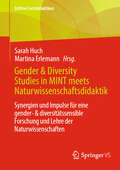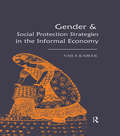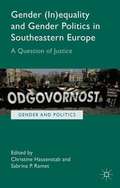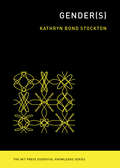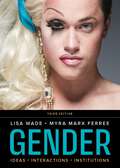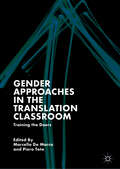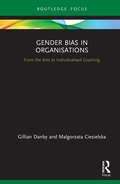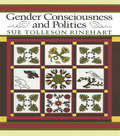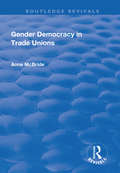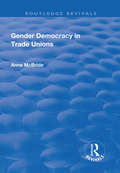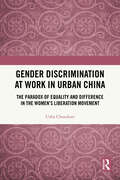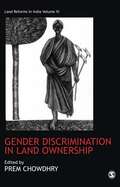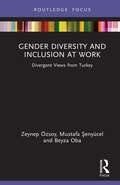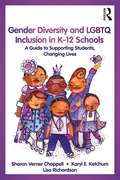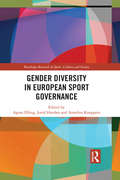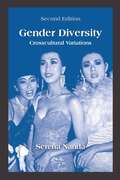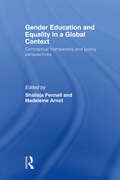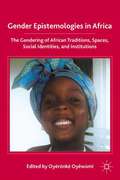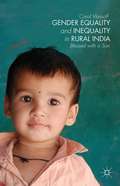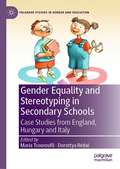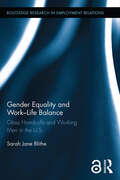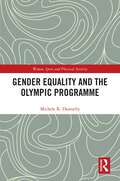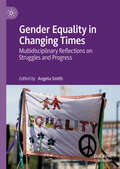- Table View
- List View
Gender & Diversity Studies in MINT meets Naturwissenschaftsdidaktik: Synergien und Impulse für eine gender- & diversitätssensible Forschung und Lehre der Naturwissenschaften (Edition Fachdidaktiken)
by Martina Erlemann Sarah HuchGender und dessen Zusammenwirken mit weiteren Diversity-Dimensionen wie etwa soziale Herkunft, ein (zugeschriebener) Migrationshintergrund oder sexuelle Orientierung stehen an Hochschulen verstärkt im Fokus. Gefordert sind dabei auch gender- und diversitysensible Ausrichtungen der Forschung und Lehre der MINT-Fächer sowie der hochschulischen Lehramtsausbildung für MINT. Welche inhaltliche Relevanz haben Gender- und Diversity-Aspekte in Fachkultur, Forschungsinhalten sowie im Wissenschaftsverständnis der Naturwissenschaften? Wie strukturieren Geschlecht und andere soziale Differenzkategorien die Forschung? Wie kann eine Gender- und Diversity-Kompetenzen vermittelnde Lehrer*innenbildung aussehen?Auf diese Fragen geben die interdisziplinären Beiträge der Wissenschaftler*innen, etwa aus Physik, Biologie, Medizin, Feminist Science & Technology Studies sowie die naturwissenschaftlichen Fachdidaktiken Antworten. Ansätze sowie Wissensbestände der Gender & Diversity Studies in MINT werden mit den gender- und diversityausgerichteten Naturwissenschaftsdidaktiken zusammengeführt. Mit vielfältigen Anregungen ermutigen sie zu einer gender- und diversityorientierten Ausrichtung der (eigenen) Forschung und Lehre.
Gender & Social Protection Strategies in the Informal Economy
by Naila KabeerThe vast majority of the world’s working women, particularly those from low-income households in developing countries, are located in the informal economy in activities that are casual, poorly paid, irregular and outside the remit of formal social security and protective legislation. This book examines the constraints and barriers which continue to confine women to these forms of work and what this implies for their ability to provide for themselves and their families and to cope with insecurity. It develops a framework of analysis that integrates gender, life course and livelihoods perspectives in order to explore the interactions between gender inequality, household poverty and labour market forces that help to produce gender-differentiated experiences of risk and vulnerability for the working poor. Drawing on practical experiences from the field, It uses this framework to demonstrate the relevance of a gender-analytical approach to the design and evaluation of a range of social protection measures that are relevant to women at different stages of their life course. These include conditional and unconditional social transfers to reduce child labour and promote children’s education, child care support for working women, financial services for the poor, employment generation through public works and different measures for old age security. The book stresses the importance of an organised voice for working women if they are to ensure that employers, trade unions and governments respond to their need for socio-economic security. Finally, the book synthesises the main lessons that emerge from the discussion and the linkages between social protection strategies and the broader macro-economic framework. A book that will be of interest to a wide range of readers—those in the fields of economics, sociology and gender studies, as also activists and policy-makers.
Gender (In)equality and Gender Politics in Southeastern Europe
by Sabrina P. Ramet Christine M. HassenstabThe collapse of socialist regimes across Southeastern Europe changed the rules of the political game overnight and led to the transformation of these societies, immediately affecting the status of women. The contributors to this volume contrast how the status of women in the post-socialist societies of the region evolved and address three central questions: First, in what ways have the situations of women and of sexual minorities changed since 1989/90? Second, to what extent have the dominant religious organizations in the region and local nationalists succeeded in promoting traditional values, how have their neo-traditional narratives challenged women and impacted sexual minorities, and how have local feminists and gay activists responded to such narratives? And third, how have the values of local citizens changed since the end of socialism, as regards gender-related and sex-related matters?
Gender (The MIT Press Essential Knowledge series)
by Kathryn Bond StocktonWhy gender is strange, even when it's played straight, and how race and money are two of its most dramatic ingredients.In this volume in the MIT Press Essential Knowledge series, Kathryn Bond Stockton explores the fascinating, fraught, intimate, morphing matter of gender. Stockton argues for gender's strangeness, no matter how "normal" the concept seems; gender is queer for everyone, she claims, even when it's played quite straight. And she explains how race and money dramatically shape everybody's gender, even in sometimes surprising ways. Playful but serious, erudite and witty, Stockton marshals an impressive array of exhibits to consider, including dolls and their new gendering, the thrust of Jane Austen and Lil Nas X, gender identities according to women's colleges, gay and transgender ballroom scenes, and much more.Stockton also examines gender in light of biology's own strange ways, its out-of-syncness with "male" and "female," explaining attempts to fortify gender with clothing, language, labor, and hair. She investigates gender as a concept--its concerning history, its bewitching pleasures and falsifications--by meeting the moment of where we are, with its many genders and counters-to-gender. This compelling background propels the question that drives this book and foregrounds race: what is "the opposite sex," after all? If there is no opposite, doesn't the male/female duo undergirding gender come undone?
Gender (Third Edition): Ideas, Interactions, Institutions
by Myra Marx Ferree Lisa WadeThe new gold standard for sociology of gender courses An instant best-seller and now the leading book for the course, Wade and Ferree’s Gender is an accessible and inclusive introduction to sociological perspectives on gender. Drawing on memorable examples mined from history, pop culture, and current events, Gender deftly moves between theoretical concepts and applications to everyday life. Revised throughout to be more inclusive and intersectional, the Third Edition features expanded coverage of the nonbinary and trans experience and new discussions of the impact of Covid-19 on families and work. This purchase offers access to the digital ebook only.
Gender And Class In English Asylums, 1890–1914
by Louise HideAn unprecedented number of people were sent to 'lunatic asylums' in the nineteenth century. But what was life like inside? How was order maintained? And why were so many doctors on the verge of a breakdown themselves? This book provides a glimpse into the lives of patients and staff inside two London asylums at the turn of the twentieth century.
Gender Approaches in the Translation Classroom: Training the Doers
by Marcella De Marco Piero TotoThis volume examines strategies for embedding gender awareness within translation studies and translator training programmes. Drawing on a rich collection of theoretically-informed case studies, its authors provide practical advice and examples on implementing gender-inclusive approaches and language strategies in the classroom. It focuses on topics including, how to develop gender-inclusive practices to challenge students’ attitudes and behaviours; whether there are institutional constraints that prevent trainers from implementing non-heteronormative practices in their teaching; and how gender awareness can become an everyday mode of expression. Positioned at the lively interface of gender and translation studies, this work will be of interest to practitioners and scholars from across the fields of linguistics, education, sociology and cultural studies.
Gender Bias in Organisations: From the Arts to Individualised Coaching (Routledge Focus on Business and Management)
by Malgorzata Ciesielska Gillian DanbyGovernment and organisational policies are not enough to challenge socially constructed expectations towards gender. Arts based methods derived from sensemaking, metaphors and storytelling can support women in modifying behaviours triggered by gender stereotype threat and help them cope better in the gendered workplace. The aim of the book is to challenge the contemporary approach of mainstreaming gender in organisations. Starting with individuals’ life stories and workplace experiences to understand the common challenges for individuals and organisations, the authors review how women respond to those challenges through strategic choice, and consequences both for the individual and the organisational impact. This book presents two types of arts inspired workshops: sensory and metaphorical engagement as well as storytelling theatre. Gender Bias in Organisations: From the Arts to Individualised Coaching discusses how gender mainstreaming initiatives have failed and proposes an individualised coaching approach based on arts-based methodology for mediating gender stereotype in the workplace. It will be of interest to researchers, academics, and students in the areas of gender, work and organisation.
Gender Consciousness and Politics (Perspectives on Gender)
by Sue Tolleson RinehartThis book examines the emergence of gender consciousness among women as a significant force in American politics. The author bases her argument on an in-depth empirical analysis of data derived from the U.S. biennial National Election studies of 1974 to 1984, the year of the emergence of the so-called gender gap. The author discusses the fact that while feminism is central to womens' political orientation, the simple awareness of gender differences and group consciousness is a powerful force of change.
Gender Democracy in Trade Unions (Routledge Revivals Ser.)
by Anne McBrideThis title was first published in 2001. Detailed interviews with activists and case studies of decision-making bodies show how different membership groups exploit equal opportunities strategies to facilitate or impede women. These case studies expose the conundrum of understanding women as a differentiated but distinct membership group. They illustrate why women activists need to be understood in their diverse and multiple roles of being low paid workers, black women, lesbians and members of political parties, but also demonstrate that women are most empowered when treated as an oppressed social group.
Gender Democracy in Trade Unions (Routledge Revivals)
by Anne McBrideThis title was first published in 2001. Detailed interviews with activists and case studies of decision-making bodies show how different membership groups exploit equal opportunities strategies to facilitate or impede women. These case studies expose the conundrum of understanding women as a differentiated but distinct membership group. They illustrate why women activists need to be understood in their diverse and multiple roles of being low paid workers, black women, lesbians and members of political parties, but also demonstrate that women are most empowered when treated as an oppressed social group.
Gender Differences in Aspirations and Attainment
by Ingrid Schoon Jacquelynne S. EcclesWhat is the role of parents, peers and teachers in shaping school experiences and informing the career choice of males and females? Does the school context matter, and to what extent do educational experiences influence young people's self-concept, values and their outlook to the future? Do teenage aspirations influence later outcomes regarding educational attainment and the assumption of work and family related roles? These questions and more are addressed in the chapters of this book, following lives over time and in context. The book is both innovative and timely, moving the discussion of gender inequalities forward, providing a dynamic and contextualized account of the way gendered lives evolve. Chapters address the role of institutional structures and the wider socio-historical context in helping young men and women to realize their ambitions. A unique feature is the longitudinal perspective, examining the role of multiple interlinked influences on individual life planning and attainment.
Gender Discrimination at Work in Urban China: The Paradox of Equality and Difference in the Women's Liberation Movement
by Usha ChandranThis book explores gender discrimination and women’s movements in China – from the May Fourth movement to present day. It critically examines the dynamics of the personal and political, or ‘home’ and ‘work’, and the role this discourse plays in women’s lives.The book looks at women's 'work' within the contested field of a gender power struggle both in the politics and society in China. Patterns of employment for women have evolved over the years and women have continued to face new challenges at home and outside as the boundaries between the political and personal blurs. This book analyses the birth of feminism in China, its amalgamation with Marxism to take the form of the women's liberation movement propagated by the party and state and its impact on shaping contemporary Chinese women. It also discusses the theoretical and practical trajectory of women's liberation movement and the changing ideas on women and gender in contemporary China.The book will be of interest to students and researchers of gender studies, political sociology, Chinese studies, sociology of work and industry, history of women's work in China, labour history, gender inequality and discrimination in the workplace in China.
Gender Discrimination in Land Ownership (Land Reforms in India series)
by Prem ChowdhryThis edited volume analyzes the different degrees of discrimination meted out to women by the country′s inheritance laws and the corresponding customary practices in tribal societies. It also exposes the current socio-legal structure in the country, which systematically denies women the accessibility to and ownership of productive resources. Gender Discrimination in Land Ownership is XIth in the series ′Land Reforms in India′, initiated by the Lal Bahadur Shastri National Academy of Administration, Mussoorie. The volume contains 14 well-researched chapters through which distinguished scholars look into the discrimination faced by women in various states of India. Highlighting the fact that different regions subject women to varied forms of discrimination, these chapters reveal that these emanate from various customs and practices, Shastric prescriptions and the Muslim personal laws (Shariat) which were crystallized during the British regime and further consolidated in the post-colonial period through various union, state and concurrent laws. Apart from describing the discrimination that women are subjected to in terms of legal rights, the collection also proposes ways to counter the same and encourages debate on the current Indian socio-legal system. With its two-pronged concern—analysis of reform laws and their impact on gender—this book will be of interest to academics in fields such as development economics, land laws, gender/women studies and sociology, as well as to policy-makers and administrators.
Gender Diversity and Inclusion at Work: Divergent Views from Turkey (Routledge Focus on Business and Management)
by Zeynep Özsoy Mustafa Şenyücel Beyza ObaThe purpose of this book is to investigate gender diversity practices and discourse developed by listed companies in Turkey. It pursues this aim by advancing knowledge about business relations affecting workplace gender diversity. The research builds on Bourdieu’s field approach and implements a Thematic Analysis following Braun and Clarke’s (2006) guidelines. The findings of the book are based on data collected from unstructured interviews and secondary sources such as the official documents of national and international organizations, newspapers, legislation, and web pages of the related parties. The findings suggest that the implementation of gender diversity practices may require a transformation of perspective and the conditions regarding the political, economic, and cultural realm for realization of a pervasive movement. Due to the conservative and patriarchal culture, authoritarian rule and neoliberal policies, gender diversity and inclusion are not seen as issues that should be resolved through the commitment and collaboration of a field. Consequently, diversity management practices are instrumentalized by the business community as a means for corporate communication and image building rather than actively building a diverse workforce.
Gender Diversity and LGBTQ Inclusion in K-12 Schools: A Guide to Supporting Students, Changing Lives
by Sharon Verner Chappell Karyl E. Ketchum Lisa RichardsonThis exploration of effective practices to support lesbian, gay, bisexual, transgender, queer (LGBTQ) and gender-diverse students in elementary, middle, and high school contexts focuses on curriculum, pedagogy, and school environment. Narratives and artwork from the field are framed by sociocultural and critical theory as well as research-based elaboration on the issues discussed. Applications of antidiscrimination law and policy, as well as learning skills like creativity, collaboration, and critical thinking help teachers tackle some of the most significant educational challenges of our time. The stories of real-world practices offer encouragement for building inclusive environments and enhancing social-emotional relationships among youth, families, and schools. Gender Diversity and LGBTQ Inclusion in K-12 Schools provides a helpful roadmap for educators hoping to create safe and empowering spaces for LGBTQ and gender-diverse students and families.
Gender Diversity in European Sport Governance (Routledge Research in Sport, Culture and Society)
by Agnes Elling Jorid Hovden Annelies KnoppersGender equality is one of the founding democratic principles of the EU. However, recent studies of the Federation of Olympic Sports in Europe have shown that women occupy only fourteen percent of decision-making positions in sport organizations. This book presents a comprehensive and comparative study of how various regions and countries of Europe have addressed this lack of gender diversity, discussing which strategies have brought about change and to what extent these changes have been successful. With contributions from leading sport sociologists, covering countries such as Germany, Hungary, Norway, Poland, Spain, Turkey and the UK, it provides a foundation for future policymaking, methodological analyses and theoretical developments that can result in sustainable gender equality in European sport governance. Gender Diversity in European Sport Governance is important reading for scholars and students in the fields of sociology of sport, sport management, sociology, gender studies and studies of organization, management and leadership. It is also a valuable resource for policy makers in the EU, as well as national sport organizations and activists.
Gender Diversity: Crosscultural Variations
by Serena NandaThis eye-opening account of the differences in how sex/gender diversity is experienced in seven cultures raises our consciousness and challenges our intellectual understandings and attitudes about what we consider natural, normal, and morally right. Nanda's examples, which reveal the complexity of social responses toward sex/gender diversity, are ethnographically well documented and represent various geographical areas and sex/gender ideologies. In classic anthropological fashion, Nanda's text enables us to cross the barriers of cultural difference to a recognition of a greater shared humanity.
Gender Education and Equality in a Global Context: Conceptual Frameworks and Policy Perspectives
by Shailaja Fennell Madeleine ArnotThe Millennium Development Goals aim to achieve basic education for all by 2015. But can such global agendas address national and local gender inequalities and will they empower women through education? This thought-provoking book offers an opportunity to engage critically with existing and emergent conceptual frameworks and methodological approaches to this global debate. It is divided into three sections that: reconceptualise the definitions of gender equality used by various social scientific disciplines, international organisations and policy makers; illustrate the methodologies used to collect the voices of young men and women and their teachers telling stories of their success in lifting the burdens of poverty and negotiating traditional gender relations; trace the impact of global gender agendas on national education policies, such as citizenship education, poverty reduction strategies, and feminist activism around adult women’s learning. Gender Education and Equality in a Global Context is an invaluable introduction to the range of conceptual frameworks and innovative research methods that address issues of gender education and development.
Gender Epistemologies in Africa
by Oyèrónké OyěwùmíThis volume brings together a variety of studies that are engaged with notions of gender in different African localities, institutions and historical time periods. The objective is to expand empirical and theoretical studies that take seriously the idea that in order to understand gender and gender relations in Africa, we must start with Africa.
Gender Equality And Inequality In Rural India
by Carol VlassoffThe status of women is how the society perceives a women and not what it should be. Women at every stage are deprived of opportunities because of their sexuality. This book is a small step towards the realization of the fragrance called woman and to accept the Kasturi that is the inherent quality of a woman.
Gender Equality and Stereotyping in Secondary Schools: Case Studies from England, Hungary and Italy (Palgrave Studies in Gender and Education)
by Maria Tsouroufli Dorottya RédaiThis book explores gender stereotyping and gender inequalities in secondary education in England, Hungary and Italy. The authors highlight the importance of addressing student and teacher attitudes if long-term changes in mindset are desired, as well as the underlying stereotypes that persist and linger in these educational contexts. Promoting a whole-school culture change approach, this book explores views of gender stereotypes from teachers and students concerning subject and career choices, as well as collaborative work with teachers, experts and NGOs in implementing and evaluating gender equality charters. Drawing on extensive research, this book employs an intersectional and cross-country approach: while the authors acknowledge the challenges and opportunities of researching gender equality frameworks across different countries, ultimately these link to the UN Sustainable Development goal of gender equality.
Gender Equality and Work-Life Balance: Glass Handcuffs and Working Men in the U.S. (Routledge Research in Employment Relations)
by Sarah BlithePressure to achieve work-life "balance" has recently become a significant part of the cultural fabric of working life in United States. A very few privileged employees tout their ability to find balance between their careers and the rest of their lives, but most employees face considerable organizational and economic constraints which hamper their ability to maintain a reasonable "balance" between paid work and other life aspects—and it is not only women who struggle. Increasingly men find it difficult to "do it all." Women have long noted the near impossibility of balancing multiple roles, but it is only recently that men have been encouraged to see themselves beyond their breadwinner selves. Gender Equality and Work-Life Balance describes the work-life practices of men in the United States. The purpose is to increase gender equality at work for all employees. With a focus on leave policy inequalities, this book argues that men experience a phenomenon called "the glass handcuffs," which prevents them from leaving work to participate fully in their families, homes, and other life events, highlighting the cultural, institutional, organizational, and occupational conditions which make gender equality in work-life policy usage difficult. This social justice book ultimately draws conclusions about how to minimize inequalities at work. Gender Equality and Work-Life Balance is unique as it laces together some theoretical concepts which have little previous association, including entrepreneurialism; leave policy, occupational identity, and the economic necessities of families. This book will therefore be of particular interest to researches and academics alike in the disciplines of Gender studies, Human Resource Management, Employment Relations, Sociology and Cultural Studies.
Gender Equality and the Olympic Programme (Women, Sport and Physical Activity)
by Michele K. DonnellyThis innovative study examines the Olympic programme from a critical feminist perspective, to shed new light on the issues of gender and inclusion at the Olympic Games and in the Olympic Movement. Incorporating both quantitative and qualitative data, the book identifies and analyzes the changes – and remaining gender differences – made on the Olympic Programmes for London 2012, and each of the subsequent Summer and Winter Olympic Games (Sochi 2014, Rio 2016, and Pyeongchang 2018), as well as the Tokyo 2020 and Beijing 2022 Games. The book draws on the IOC&’s own publications, information from International and National Sport Federations, and media sources to describe and explain the IOC&’s slow and uneven progress toward gender equality at the Olympic Games. This is important reading for any student, researcher, practitioner or policy maker with an interest in the Olympic Games, sport studies, gender studies, women&’s sport or major events.
Gender Equality in Changing Times: Multidisciplinary Reflections on Struggles and Progress
by Angela SmithThis edited collection explores issues of gender equality in the global context. Campaigns to achieve gender equality throughout the twentieth century brought about huge changes in westernised countries. In particular, the achievements of second-wave feminism with regards to gender and sexual equality benefit many people today. The famous 'seven demands' of the second-wave movement form the basis of the chapters of this book, probing the advances made legally, socially and culturally. Contributors to this collection acknowledge the advances brought about by the second-wave movement, but highlight the work which still needs to be done in the twenty-first century, including the changes in society that have resulted in shifts in masculinity. Gender Equality in Changing Times is divided into two parts, following an overview of theoretical debates and social contexts that lead us to the current period of gender and sexual relations. Part One looks at gender equality by exploring the 'experience' of being part of a group where gender boundaries still exist, drawing on auto-ethnographies of those in key groups that are central to this debate, as well as interviews with members of such groups. Part Two investigates wider representations of these groups, offering an insight into the geopolitical world of gender relations in Saudi Arabia and China. Ultimately, this collection shows how much has been achieved, yet how far is also left to go. Students and scholars across a range of disciplines, including gender studies, history, education, sociology, media studies, politics, business studies, cultural studies and English literature and linguistics, will find this book of interest.
